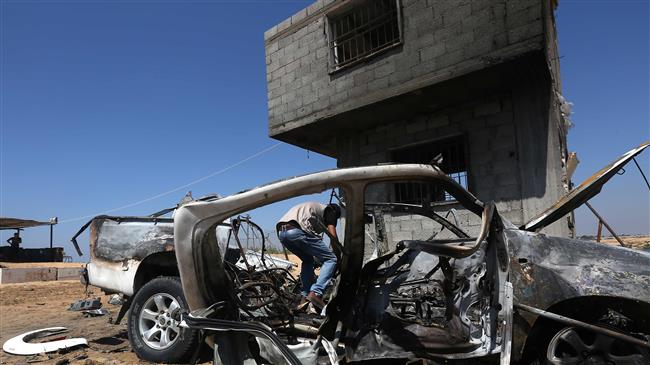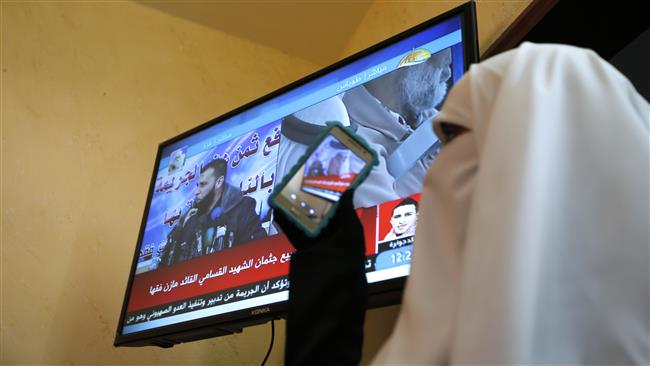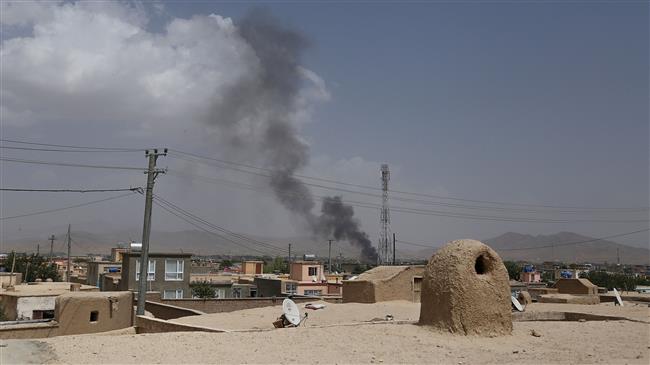Zionist regime seeks limited ceasefire with Gaza


The Tel Aviv regime may agree to a limited ceasefire with Palestinian resistance groups in the besieged Gaza Strip, Israeli officials have hinted.
An unnamed Israeli official said Sunday that there might be talks focusing on a proposal to ease the blockade of Gaza if the Palestinians calm their side of the fence that separates the occupied territories from the blockaded coastal sliver.
“A complete ceasefire (by the Palestinians) will lead, on Israel’s part, to the reopening of the Kerem Shalom crossing and renewal of the permits given in respect to the fishing zones,” Reuters quoted the official as saying.
The offer would be the focus of later deliberations, the official said, adding that any eventual broader agreement over Gaza would require a guarantee for the return of the remains of two Israeli soldiers killed in the 2014 Israeli war on Gaza. Hamas and other resistance groups have linked their fate to Israel freeing Palestinian security detainees.
Hussam Badran, one senior Hamas official, during a Sunday interview with Gaza radio station said, “Hamas has conducted internal meetings that have not yet ended.”
“The suffering of our people, and the 12-year blockade imposed with no guilt on their part, requires that all Palestinian leaders search for a real solution to this suffering … without giving concessions when it comes to the known and outstanding positions and rights of our people,” the Hamas official said.

Israeli Prime Minister Benjamin Netanyahu earlier convened his cabinet to possibly approve proposals made by the United Nations (UN) and Egypt for preventing another war on Gaza. The UN and Egypt have not publicly detailed the proposals. They have spoken generally of a need to improve humanitarian conditions in Gaza.
Gaza has seen a surge in tensions since Palestinians launched weekly protests along the fence. In response to the protests, Israel on July 9 tightened the blockade by shuttering Gaza’s main commercial terminal and limiting a Palestinian fishing zone off the enclave. It offered to reverse the measures on Sunday.
The Fatah movement of Palestinian President Mahmoud Abbas, who holds sway in the Israeli-occupied West Bank, earlier said any deal risked ending hopes of achieving Palestinian statehood.
“(A deal would bring about a) separation of Gaza from the rest of the homeland and would create a mini-state which will be the graveyard of our national project,” said Munir Al-Ghaghoub, a spokesman for Fatah.
But after a meeting of the representatives of Palestinian factions, including Fatah, Badran said, “There will be no state in Gaza and no state without Gaza.”
Tensions have been running high near the fence since March 30, which marked the start of a series of protests dubbed “The Great March of Return.” Palestinian protesters demand the right to return for those driven out of their homeland.
The clashes in Gaza reached their peak on May 14, the eve of the 70th anniversary of Nakba Day, or the Day of Catastrophe, which coincided this year with Washington’s relocation of the US embassy from Tel Aviv to occupied Jerusalem al-Quds.
Israeli fire has taken the lives of at least 157 Palestinians since March 30.




